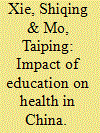| Srl | Item |
| 1 |
ID:
155935


|
|
|
|
|
| Summary/Abstract |
Despite the surge in interest in the educational attainment of Chinese political leaders over the past decade, previous studies have primarily focused on the highest educational degree obtained. There is a paucity of quantitative assessment on the educational dynamics of Chinese political leaders. This article attempts to trace the educational trajectories of 1,891 Chinese provincial leaders from 1990 to 2013 by distinguishing full-time education from the highest educational status attained, and by delineating the route of educational advancement. The interpretation of the empirical findings is able to better explain the elite transformation of provincial leaders in reform-era China and the corresponding changing political legitimacy.
|
|
|
|
|
|
|
|
|
|
|
|
|
|
|
|
| 2 |
ID:
133181


|
|
|
|
|
| Publication |
2014.
|
| Summary/Abstract |
In this paper, we investigate the causal effect of education on health using an instrumental variable approach. The instruments we employ consist of two institutional changes in China that generated discontinuities in educational attainment among individuals. To ensure the validity of the instruments and obtain prudent conclusions, we adopt more restrictive identification tests than previous studies. The results indicate no causal impact of education on either perceived health or anthropometric health. With regard to the impact of education on male health behavior, namely smoking, we cannot provide conclusive results due to a violation of the exogeneity of our instruments. Nevertheless, we can confirm that education has no causal effect on female health behavior. To overcome the widely documented shortage of quasi-experimental identification, we also employ spouse's education as an alternative instrument to examine the causal effect of education. Identical results are obtained, with the exception that the impact of education on the reduction of overweight among women becomes significant. We conclude that this provides some evidence of a causal impact of education on health.
|
|
|
|
|
|
|
|
|
|
|
|
|
|
|
|
| 3 |
ID:
119156


|
|
|
|
|
| Publication |
2013.
|
| Summary/Abstract |
This paper investigates trends in intergenerational patterns of educational attainment of those born in China between 1941 and 1990. Employing the 2008 Rural-Urban Migration in China and Indonesia Survey, we find that intergenerational correlation is lower in rural and migrant than in urban populations. The higher mobility observed in rural and migrant populations stems from the fact that the majority of these children complete only junior high school, with some children in the youngest cohorts moving down the education ladder relative to their parents. In contrast, urban children seem to at least maintain their parents' education level. The persistence of intergenerational transmission of education at high levels in urban areas combined with some mobility, upward or downward, in rural areas is likely to aggravate China's rural-urban disparity. Policies should focus more on the underlying gaps in education opportunities and the improvement in education of the rural and migrant populations.
|
|
|
|
|
|
|
|
|
|
|
|
|
|
|
|
| 4 |
ID:
159068


|
|
|
|
|
| Summary/Abstract |
Based on a random sample from 1 percent population survey data of 2005, this paper studies the impacts of Tangshan Earthquake on the educational attainment and subsequent labor market outcomes of affected cohorts using the methodology of difference-in-differences model and the local average treatment effect interpretation of instrumental variables technique. We find that the schooling years of the cohorts potentially affected by Tangshan Earthquake is 14%–21% of a year of schooling lower than the non-earthquake cohorts, which can be considered as the shortterm educational cost of Tangshan Earthquake. The rate of returns to years of schooling for the earthquake cohorts is 20.93%–27.85%. The earthquake leads 3.51%–4.77% loss of average income through the reduction of schooling years. A loss of 0.30%–0.41% of GDP in 2005 can be attributed to the lower educational attainment of the earthquake cohorts, which can be considered as the long-term educational cost of Tangshan Earthquake.
|
|
|
|
|
|
|
|
|
|
|
|
|
|
|
|
| 5 |
ID:
172370


|
|
|
|
|
| Summary/Abstract |
Thailand has no equal employment opportunity (EEO) laws or mandatory women’s quota system as seen in developed countries. The only exception is a provision in the Thai Constitution that states that men and women shall enjoy equal rights. Despite this, the country has one of the world’s highest number of women in management positions. It is generally held that Thai society has given women the opportunity to progress at the same rate as men within the workplace. Given this background, this paper examines the factors behind the high participation rate of Thai women in business and management without the support of institutional EEO legislation and mandatory state regulation from the supply side. It argues that, as Thailand transforms into a super-aged society, gender equality strategies, particularly non-discriminatory employment opportunities and work-life balance measures, should be consistently provided to ensure sustainable and inclusive growth.
|
|
|
|
|
|
|
|
|
|
|
|
|
|
|
|